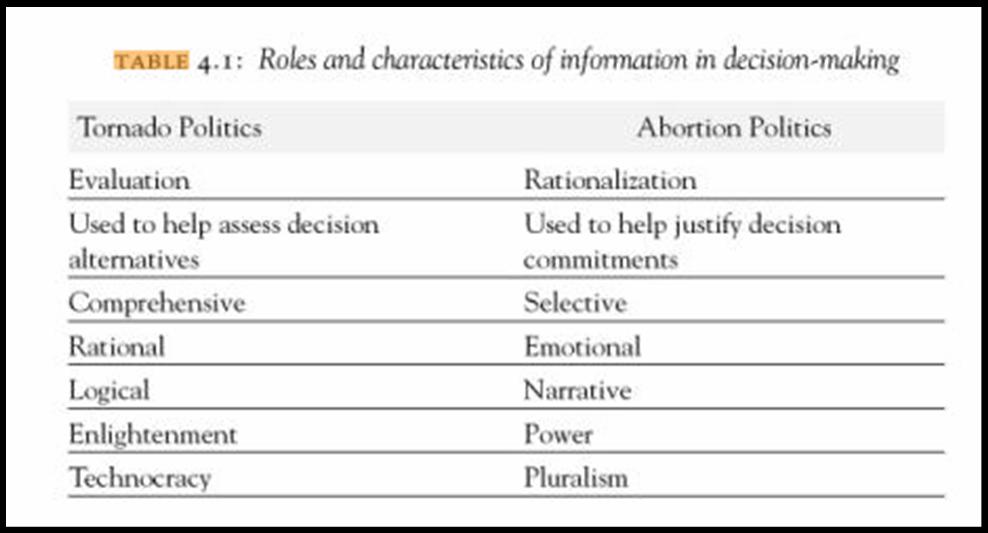Climate Politics as Abortion Politics
March 3rd, 2009Posted by: Roger Pielke, Jr.
In The Honest Broker I argue that political context is an important determination of how information is used in decision making. I distinguish between what I call “Tornado Politics” and “Abortion Politics.” The former can be understood in terms of a hypothetical situation where a group a people have to make a decision about what to do in the face of an approaching tornado, and the latter in terms of a group of people making a decision about a policy on abortion for the group. I argue that the role of information will be very different in the two contexts, because Tornado Politics are characterized by shared values and a decisive role for scientific information, whereas Abortion Politics are characterized by values conflicts and little (or no) role for scientific information.
A common tendency in political debates is for advocates to present issues best characterized in terms as Abortion Politics as a matter of Tornado Politics. Thus, this tendency is the basis for the commonly invoked phrase that “the science says that we should . . .” take a particular course of action. In this manner science becomes a proxy for political battles. I argue in the book that when there is a values dispute, debate will necessarily take the form of Abortion Politics, regardless of efforts to characterize it as Tornado Politics. Below is Figure 4.1 from the book, which column best characterizes debates over climate change?

March 3rd, 2009 at 4:18 pm
Out of curiosity, is pluralism the “us” vs “them” characterization of the sort that appears in Tobis’s comments. (His “us” was ““us” that matches the set of politically active scientists you criticize”)
Is “power” argument reflected in his allusion to private interests who, if we take Michael at his word, seem to be successfully making some people appear to harbor wooly-eyed fantasies? Are the allusions to the mortality of billions emotional rather than rational?
March 4th, 2009 at 9:40 am
The whole thing is totally baffling.
We seem to have a bunch of people proclaiming the imminent arrival of a tornado. They do their best to prohibit any discussion of whether this is true on the grounds that such discussions confuse and distract from taking the necessary action.
But the only sort of actions they will entertain are ones that will not in fact save any lives if the predicted tornado arrives. It is utterly weird.
March 5th, 2009 at 7:56 am
Roger,
You wrote: “I argue in the book that when there is a values dispute, debate will necessarily take the form of Abortion Politics…”
What is the ‘value dispute’ in climate science? With abortion, the dispute is over the definition of human life and the value we give to that life. Science can not really help us decide that value, for it is more a product of our moral and ethical perspective than any factual data. Climate change, like a tornado, should be all about factual data, but it obviously isn’t.
So I ask once again, what are the specific values we are disputing? What are the values held by each side and where did those values originate? Have similar values been held by different peoples throughout history and what were the societal impacts of holding those values?
Does it ultimately come down to the philosophical question of humanities role in the universe? That’s where my thoughts are leading me. One side believes that humanity is basically good (at least as good as any other product of the universe), and will naturally correct any behavior that proves to be ultimately dangerous. The other side believes that humanity is basically evil, and must be constantly monitored and controlled in order to protect the rest of the universe.
Is this really what we are arguing about?
March 5th, 2009 at 8:15 am
-3-Jim
The values dispute I refer to involves how we many billions are to live on planet Earth, our attitude toward risk, and how we should use our finite resources (especially public monies). As you write on another thread:
“. . . the possible trillions of dollars of direct and unintended costs of proposed climate change policy”
For some this is money well spent, for others, it is a waste. That difference is one of values.
March 6th, 2009 at 12:22 pm
I have long held this to be true as well. By assuming that people will care about global warming, even if it is proved beyond a shadow of doubt, is already projecting a value judgment upon someone. I imagine there are people who really do not care what happens after their lifetime.
This is always one of the key things I like to bring up when discussing the whole issue.